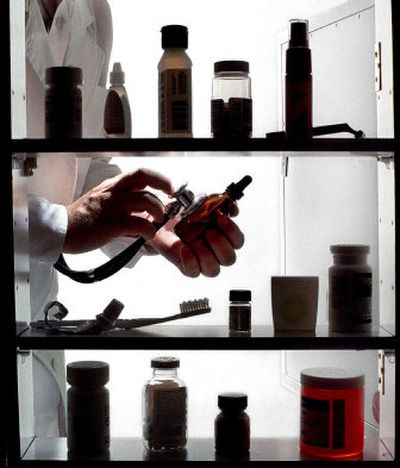Keep medicine cabinet stocked

It’s 3 a.m. and someone in your house has the sniffles.
It’s 3 p.m. and someone else just skinned his knee.
What should you have in your medicine cabinet to make sure you’re ready for minor maladies? Here’s a rundown of some readily available items that doctors recommend:
•Bandages. No one disputes that a box of bandages will prove useful to treat everything from skinned knees or elbows to annoying paper cuts. Be sure to stock up on different sizes.
Elastic bandages and a compression bandage will help give wounded limbs stability should the occasion arise.
•A cold pack. You can even substitute an extra bag of frozen vegetables – to ice down injuries if necessary. A hot pack or a warm washcloth can ease the soreness of a muscle injury.
•Pain medicines. Acetaminophen, ibuprofen and aspirin can all help for adults. But when it comes to kids, don’t administer aspirin.
•Itches. Hydrocortisone cream can be used all over the body for mosquito bites or other itches; anything stronger, you should keep off your face, he adds. Calamine lotion is another good bet.
•Antiseptics. Here, medical opinions differ. A gentle cleansing with soap and water is best, according to Dr. Ann Zerr, associate professor of clinical medicine at Indiana University School of Medicine. Some people reach for the hydrogen peroxide, but not Zerr.
“Hydrogen peroxide should almost never be used,” she says. “Hydrogen peroxide in general is very hard on tissue, so usually it kills more good things than bad. … It’s very hard on healing skin.”
•Stomach remedies. Pepto-Bismol can work for adults. But products like Pepto-Bismol and Kaopectate should not be given to young children.
They contain salicylates, also found in aspirin, which are linked to Reye’s syndrome, a potentially life-threatening disorder.
•Cough and cold medicines. Most doctors recommend cough medicines with dextromethorphan, which works by suppressing the cough reflex. When it comes to colds, preferences differ. A medicine that combines an antihistamine with a decongestant works well for some people, Zerr says. Others don’t like medicines that have antihistamines, which are drying agents. These dry up the mucus all over the body and can lead to ear or sinus infections.
Children, however, especially infants, are a different story. Some recommend saline nasal drops and then a little bulb syringe to aspirate infant mucus.
Until a child is old enough to alert a parent to medicine’s side effects, use caution with any type of cold or cough medicine.
•Tweezers, magnifying glass. You will need these for splinters.
•Digital thermometer.
•Sunburn relief. Keep sunscreen handy whenever you’re outside. If you get burned, acetaminophen or ibuprofen may ease the symptoms.